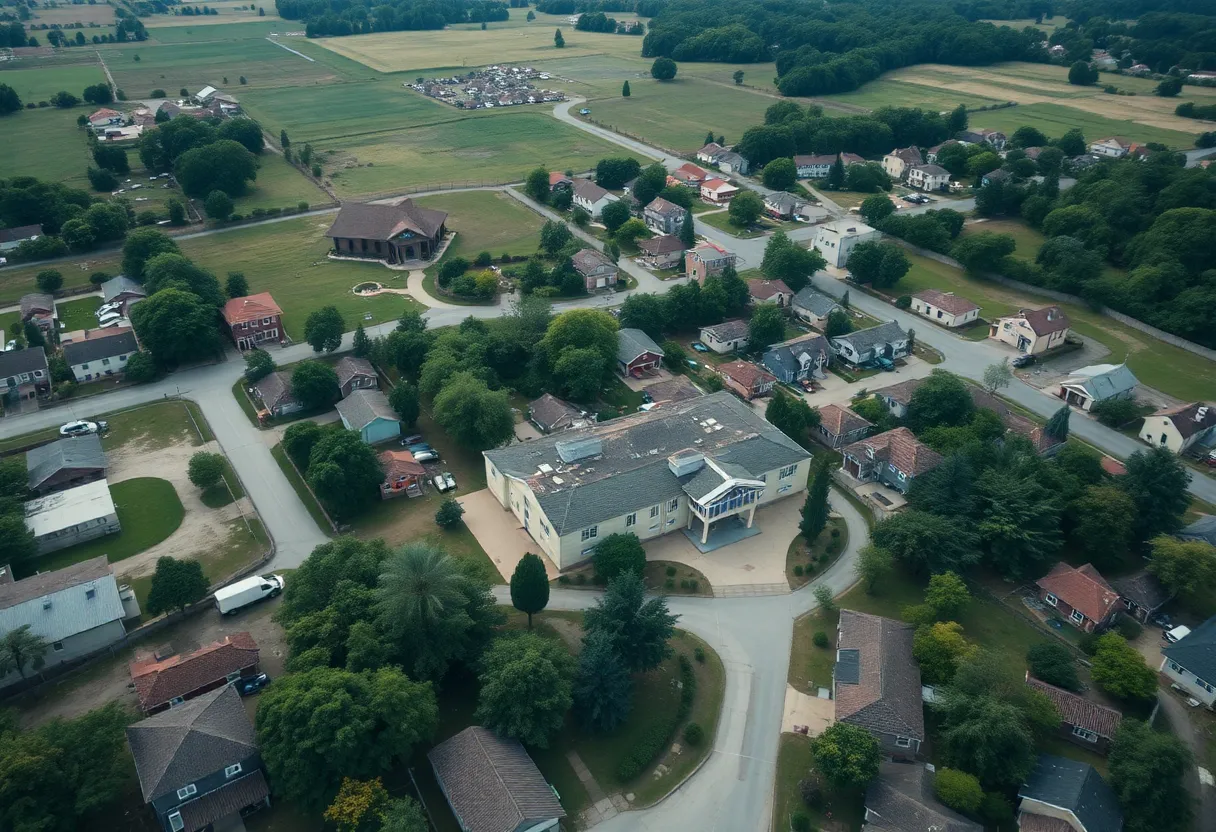News Summary
The sudden closure of the Center for Asbestos Related Disease in Libby raises serious health concerns for residents exposed to asbestos.
Closure of Asbestos Screening Clinic in Libby, Montana: A Community’s Health at Risk
A sudden court ruling has resulted in the closure of the Center for Asbestos Related Disease (CARD), a crucial clinic in Libby, Montana, which has been a lifeline for many residents suffering from asbestos-related health issues. The Lincoln County Sheriff’s Office executed a court order on a Wednesday, enforcing the seizure of CARD’s assets in response to a staggering $3.1 million judgment issued against the clinic in favor of the BNSF railway company.
A Toxic Legacy
Libby, a small town with a population of around 3,000, has long grappled with the devastating consequences of asbestos exposure from a nearby mine. The contamination has caused an alarming rate of illnesses among residents, leading to significant public health concerns. BNSF Railway has been implicated in the pollution, as they were found transporting contaminated materials through the town, further exacerbating the community’s plight.
The clinic has been operational for over 20 years, providing essential health screenings and treatment services to those impacted by the toxic dust. However, a recent legal battle has brought its operations to a standstill. In early 2023, BNSF successfully sued CARD, accusing the clinic of fraudulently qualifying patients for government benefits despite their apparent lack of illnesses. As a result, the court ruled that 337 patient diagnoses made by the clinic were indeed false, complicating the already grim situation.
The Financial Fallout
The $6 million judgment against CARD includes not only the damages owed to BNSF but also attorney fees and interest accrued during the legal process. This hefty financial paragraph represents significant liabilities for a clinic already struggling to maintain operations. BNSF, acting as a representative of the federal government, is seeking restitution for funds spent on Medicare benefits claimed deceitfully by the outpatient center.
Despite the adverse ruling, CARD attempted to navigate its operations under a previously established bankruptcy settlement; however, the recent court sanctions made its continuance infeasible. The clinic’s Executive Director expressed concern that this closure would drastically reduce health screenings for individuals at risk of asbestos-related diseases—a critical service that has been available to the community for years.
Community Implications
Health experts and community leaders are left grappling with the consequences of the clinic’s shutdown. CARD has been a crucial resource, with their operations funded predominantly by a grant from the Centers for Disease Control and Prevention (CDC), contributing about 80% of its budget. With CARD out of service, the future health outcomes for individuals exposed to the dangerous fibers from the nearby vermiculite mine are now uncertain.
The Libby area’s historical struggles with asbestos contamination are not isolated incidents, and the implications of this closure raise alarms not just for Libby but also for similar communities across the nation that deal with the aftermath of industrial pollution.
A Bitter Fight
In the wake of the clinic’s closure, BNSF has faced multiple lawsuits from other victims of asbestos exposure in Libby and the surrounding areas; their ongoing legal battles continue to cloud the company’s reputation. The railroad’s actions were motivated by a desire to ensure accountability for the damages caused by the widespread contamination and the resulting fraudulent claims made on behalf of unsuspecting residents seeking treatment.
For Libby, this incident further highlights the critical importance of maintaining oversight of healthcare facilities, especially in areas plagued by environmental hazards. The message from this ruling and the clinic’s closure is a potent reminder of the vigilance still needed to protect the public health and hold those responsible for the contamination accountable.
As Libby residents confront the challenges ahead, community members and advocates are left hoping for a resolution that prioritizes health and safety, allowing the town to recover from the toxic legacy that has lingered for decades.
Deeper Dive: News & Info About This Topic
HERE Resources
Health Risks From Urban Transformation in Kadikoy: A Communities’ Plea for Action
Closure of Libby’s Center for Asbestos Related Disease Clinic After Court Ruling
BREAKING NEWS: Asbestos Screening Clinic in Libby, Montana, Abruptly Shut Down
Bestwall’s Bankruptcy Battle: A Legal Tangle Over Asbestos Liability
Controversy Erupts as Asbestos Clinic in Libby, Montana, Faces Closure Amid Legal Battle
Closure of Asbestos Clinic Leaves Libby Residents in Health Limbo
The Closure of the CARD Clinic: A Blow to Libby’s Asbestos Victims
Closure of the Center for Asbestos Related Disease Shakes Libby, Montana Community
The Closure of Libby’s Asbestos Screening Clinic: A Public Health Crisis
Asbestos Screening Clinic Closure Leaves Libby Residents in Jeopardy
Additional Resources
- AP News: Closure of Asbestos Screening Clinic in Libby
- Wikipedia: Asbestos
- The Western News: Libby’s CARD Clinic Closed
- Google Search: Libby Montana Asbestos Clinic
- KPAX: Libby Asbestos Clinic Shuttered
- Encyclopedia Britannica: Libby
- Asbestos.com: Asbestos Clinic Appeals Penalties
- Google News: Libby Montana Asbestos Clinic News



















